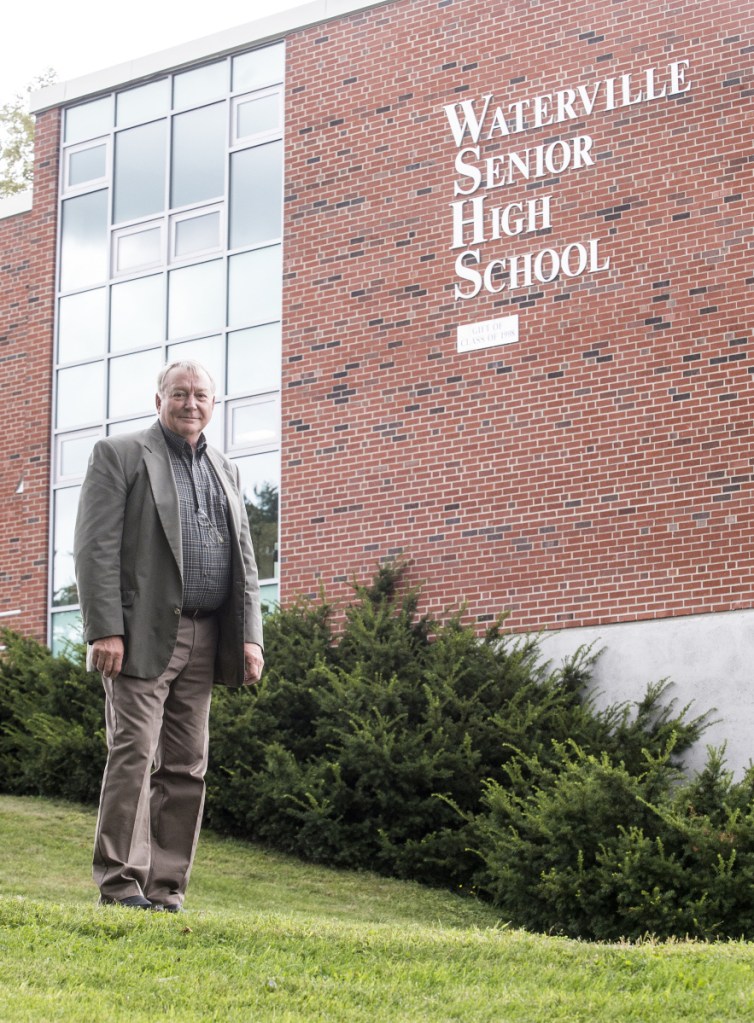WATERVILLE — Administrators and school board members at a public hearing Tuesday night argued that — while slightly more costly — a Waterville school system independent of Alternative Organizational Structure 92 would be more beneficial for students in the long run.
The meeting, which took place at Waterville Senior High School’s media center, aimed to inform residents about the reasons the district is moving to dissolve itself and the ramifications of the three communities — Vassalboro, Waterville and Winslow — reclaiming complete control over their municipality’s schools.
The decision to form an AOS in the first place was a reaction to a threat from the state Department of Education, AOS 92 Superintendent Eric Haley told the roughly 50 residents in attendance. At the time, in 2009, the state said school systems of fewer than 2,500 students that did not consolidate would face hefty financial penalties. The threat of penalty was great enough that the three communities consolidated as an AOS, which granted each community some independence by maintaining its own school board.
When Haley and the AOS board first discussed terminating the district recently, the state was offering financial incentives that would benefit the communities if they did dissolve the AOS and restructured as a regional service center.
It was believed initially that by restructuring as a service center, which would handle many of the administrative tasks of a superintendent’s office, the communities could receive up to $246 per student in state funding. However, the state has withdrawn its offer and would give schools only $46 per student to form service centers. Haley said he has not been provided enough information on how these centers would work for that money to be enough for the communities to pursue that process.
The DOE was contacted for a comment but did not respond by Wednesday evening.
Over the last 9 years, Haley said, the district has learned that the governance structure of an AOS is untenable. Administrative directors, including himself, carry an incredibly heavy workload by overseeing three community school systems and are spread too thin and are burning out, he said.
Additionally, he worries that the AOS relies too heavily on a limited number of people and he is afraid of what would happen if those people, many of them now reaching retirement age, left the AOS.
“I’ve said many times that you can design the worst system in the world, put great people in that system, and they will make it work,” he said. “If you put bad people in the system, or rather people who are not very good in their job, the system will fail.”
If the school systems separate, Winslow and Vassalboro will hire their own superintendents and additional personnel. Haley will become responsible solely for Waterville schools. In turn, that will free him up to spend more time working with students in classrooms and serving as an educational leader for his teachers and principals.
The way things run now, Haley spends most of his time working on administrative tasks, creating budgets, negotiating contracts and meeting with boards, councils and committees.
“I feel awful that I’m using the vast majority of my time at administration and not leadership,” Haley said. Last year, during a contentious school budget meeting, he said he was “embarrassed beyond belief” when he could not provide an answer to a resident who asked him what three things he would like to see done if Waterville had all the money in the world.
“I couldn’t give him an answer,” he said, citing his inability to be able to focus on just one community. “If we do this, next time someone asks me what I’d like to do, I won’t just have three answers, I’ll have five to tell him.”
Joan Phillips-Sandy, a board member who represents Ward 3, said she remembers what it was like when Haley was able to spend time inside the schools every day. Back then, the policy committee, which studies initiatives the schools could implement to make them better, would meet at least once a month. Now, committee meetings are rare.
“We’ve lost over the last 9 years. We used to meet regularly. We haven’t had one this year,” Phillips-Sandy said. “We’re not sure what policy we’re missing that we could have there. There’s a whole academic leadership piece about the superintendent’s job that’s going on in the buildings and the classrooms. You can’t figure that out when you’re looking at the spreadsheets across the street.”
The estimated cost of leaving the AOS system and securing Waterville’s own superintendent will come out to about $42,178. Winslow will likely spend $97,012 more per year, and Vassalboro is expected to save $45,650 each year if the district is dissolved.
The extra cost will come from contracting some services, which Waterville currently gets from the AOS, with Winslow. The three communities will still lean on one another through interlocal agreements that allow them to contract their resources, and that is the only financially viable way to dissolve the AOS. Waterville will receive revenue by contracting out services such as payroll, maintenance, technology and other services to Winslow and Vassalboro.
Waterville will likely be receiving a one-time payment of $133,760 from the AOS’s undesignated fund if the district is dissolved, which would make the dissolution financially neutral for three years. In the interim, Haley said the board will evaluate what they can do to make it financially neutral beyond that point. One option is opening themselves up to provide contracted services, such as payroll, to other schools and business.
But for residents who are concerned about the $42,000 increase, Phillips-Sandy said it was a small fraction of an average Waterville school budget.
“To try to predict anything 3 years out — when the state changes the rules of the game all the time, given that people retire, and prices increase — it’s impossible,” she said.
Some residents worried that Winslow and Vassalboro will go elsewhere for services and leave Waterville with a serious loss in revenue.
Haley said while he can’t completely guarantee that won’t happen, he said he’s pretty confident the two will contract with Waterville because no company would be able to match the low price Waterville is offering or their great service. Furthermore, he argued, Winslow’s and Vassalboro’s survival also will rely on the revenue they receive from Waterville, so broaching an interlocal agreement would be unwise.
There will be one more hearing on the referendum starting at 7 p.m. at Vassalboro Community School on March 6. The referendum will take place in each community on March 13, and it will take only one community voting in the majority to dissolve the AOS.
Emily Higginbotham — 861-9239
ehigginbotham@centralmaine.com
Send questions/comments to the editors.





Success. Please wait for the page to reload. If the page does not reload within 5 seconds, please refresh the page.
Enter your email and password to access comments.
Hi, to comment on stories you must . This profile is in addition to your subscription and website login.
Already have a commenting profile? .
Invalid username/password.
Please check your email to confirm and complete your registration.
Only subscribers are eligible to post comments. Please subscribe or login first for digital access. Here’s why.
Use the form below to reset your password. When you've submitted your account email, we will send an email with a reset code.